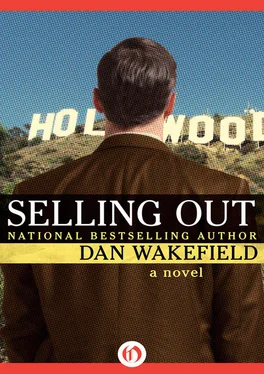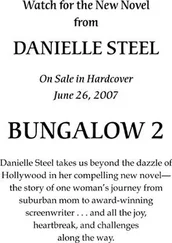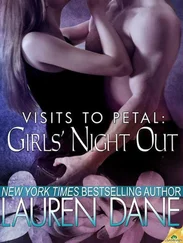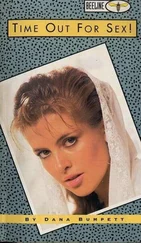Mel Brooks was across the room, simply having dinner. Digesting it, no doubt, much like everyone else. There was a woman—what was her name?—who used to play a detective’s girlfriend on one of those nighttime series a couple of years ago. Every face was teasingly familiar. The sense that you either knew or ought to know who everyone was from having seen them in movies or TV or the pages of magazines or newspapers gave an interesting edge to the occasion, a sense of inherent drama, the illusion of being on the other side—the in side—of the screen or page or camera.
Perry was acutely aware of all this and was able to appreciate and enjoy it without being snowed by it. He had that light, buoyant feeling of being on top of things, of seeing and hearing everything around him with the special clarity that is the gift of an author. He was taking mental notes of his own reactions to what other people were doing and saying, and the realization of what a different scene this was from his usual academic and small-town Vermont milieus made it especially absorbing. What a ripe new setting for what Jane called his field anthropology! Yet part of the trick of being a good observer was not sticking out from the scene, not letting the natives know you had your eye on them, but rather, trying to relax and blend in. That was what Perry was doing as he listened in genuine fascination to the evening’s host regaling his guests.
“Don’t forget the cars, the people always love cars!” Archer said, doing his imitation of the old executive who had called out that exhortation to him and Perry as they left the network meeting. The women were delightedly amused at the comic rendition Archer was giving of the now historic meeting at which “The First Year’s the Hardest” was pitched and sold.
“And then what?” Archer’s date asked eagerly.
“And then,” Perry said, adding his bit to the entertaining account, “I held my breath, terrified that Archer was going to tell me in the elevator that I had to write a couple of car chases into my script.”
Everyone laughed at Perry’s self-confessed naivete, and the misconception that Archer might be so gross.
“Perry didn’t realize the car-chase man is simply one of those characters who’s been around the business forever and has no power,” Archer explained.
“That’s right—I thought because he was the oldest man present, and was wearing a suit, he must be the head honcho,” Perry admitted, to everyone’s amusement.
“So who is he, really?” Jane asked with interest.
“Harry someone?” Perry asked.
“Harry Flanders,” Archer affirmed with a nod. “Worked on the old ‘Highway Patrol,’ got a rep as a programming genius, and kept getting kicked upstairs at the network. He’s part of the furniture now.”
“And I guess he keeps suggesting putting cars into every program, no matter what it is,” Perry said, displaying his new insider’s knowledge.
“‘The people love ’em,’” Archer intoned, imitating the powerless old exec.
“That’s him to a T,” Perry laughed.
“I wish I could have been a fly on the wall at that meeting!” said Phyllis Clare.
“You should have seen Archer’s performance,” he told her. “The man is a true artist.”
“That’s what he keeps saying all the time about you ,” Phyllis purred.
“Hey, I’m going to expose you now,” Archer told his beautiful date, then pouring more champagne into all the glasses he spoke confidingly to Jane with the same sort of wink he had given Amanda LeMay at the network meeting. “It just so happens that Phyllis here is Perry’s biggest fan.”
“Next to me, you mean,” Jane said. “And I have seniority—and tenure!”
Perry nudged her under the table. The adulation was getting a bit thick, he felt, even for a literary man from the boonies who privately believed he wasn’t appreciated as much as he might be by the world at large.
“It’s you who deserve the kudos tonight,” Perry said, raising his glass to Archer, and telling the women with a wink of his own, “His performance at the network meeting should have won him an Oscar—or should it be an Emmy, for television?”
“Better get that right, amigo ,” Archer said. “That’s the one you’ll be collecting for your trophy case a year from now. The Emmy, for best original screenplay.”
“I’ll drink to that,” said Phyllis Clare, beaming as she lifted her glass.
Perry shifted uneasily in his seat.
“I think we’re getting ahead of the game,” he said. “I haven’t put a word on paper yet.”
“Not to worry,” Archer assured him. “We’ll get you under way first thing in the morning.”
“With that in mind, I think we better order now,” Perry said.
“What do you recommend here, Archer?” Jane asked.
“Let’s find out what Dom is up to with the veal tonight,” the suave young host said, raising a finger that immediately drew a waiter, captain, and sommelier at the same time. The sommelier poured the last of the champagne from the bottle at the table and Archer gave him a brisk nod and snapped out a single-syllable directive:
“ More .”
“So what did you think of the amazing Archer Mellis, boy wonder?” Perry asked, as he stumbled out of his pants later that evening and aimed for bed.
“Amazing,” said Jane.
“That’s my adjective. Be original.”
Jane stopped rolling down her panty hose and pondered for a moment.
“Smooth,” she said.
“Smooth? I’d have bet you’d say ‘slick.’”
“I don’t know,” Jane said, tossing her panty hose away, “I’m trying to convey his ‘operator’ quality. I kind of like ‘smooth.’ As in ‘a real smoothie.’”
Perry started to laugh, but a hiccup interrupted.
“‘Smoothie?’ That’s an oldie but goodie, all right. I like it.”
“It’s closer to the mark than ‘slick,’” Jane said, snuggling into bed next to Perry. “That sounds a little too ‘oily,’ too conniving.”
“Well, I’ll find out for sure tomorrow. When we really get down to the script. The nitty-gritty. That’s when we find out just how much of a con artist this character really is.”
“The only thing that matters is he can’t con you .”
“Nope. I come equipped with what good ole Papa Hemingway said all real writers got—my built-in shit detector.”
“Mmm,” Jane said. “Lucky you. That way you’re able to tell the difference between a sincere fan like me and a snippy little fake like Phyllis Clare.”
Perry smiled, turning out the light and pulling Jane close against him.
“Mmmm. I love you.”
“Mmmm. You top …”
The earthenware mugs of black coffee in Archer’s office were so hot that steam came off of them. The strands of gray steam curled upward in the lemon-tinted light of the cool morning, making Perry think of Indian smoke signals, secret communications among conspirators. Archer told his secretary to hold all calls. There was a sense of purpose and subdued excitement like that feeling in college when a couple of like-minded friends get together and decide to start a magazine.
Was it all planned, a deluding illusion?
Archer was quiet, concentrating. He had taken off his combat boots and was pacing the room in stockinged feet, wearing a one-piece orange jumpsuit that seemed to be made of parachute silk. Occasionally he blew on his mug of coffee or took a quick sip of it, speaking in low serious tones of “essences,” of “values,” nodding approval of the few suggestions Perry made.
Still, there was not exactly a story.
Yet.
Archer suddenly pointed at Perry.
“ What if —” he said.
Читать дальше












